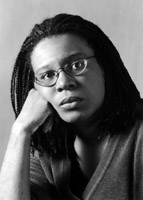
Today’s prompt is a bit unconventional in the sense that it won’t ask you to dig into a particular element of craft or technique, but rather to engage in a larger conversation that’s developed in the past few weeks about creative writing, race, and the difficulty of navigating the relationship between the two — especially here, in America, in the 21st century.
If you aren’t familiar already with some of the questions and accusations that have risen from the fairly controversial discussion between Claudia Rankine and Tony Hoagland… well, you should be. Rankine’s personal website gives a thorough account of the back-and-forth between herself and Hoagland in the period leading up to AWP (just click on the link to “AWP” listed under “Criticism”), and the Poetry Foundation blog offers a succinct account of the conversation as well.
Take a moment to familiarize yourself with the conversation, then read the text of Rankine’s open letter:
Dear friends,
As many of you know I responded to Tony Hoagland’s poem “The Change” at AWP. I also solicited from Tony a response to my response. Many informal conversations have been taking place online and elsewhere since my presentation of this dialogue. This request is an attempt to move the conversation away from the he said-she said vibe toward a discussion about the creative imagination, creative writing and race.
If you have time in the next month please consider sharing some thoughts on writing about race (1-5 pages).
Here are a few possible jumping off points:
– If you write about race frequently what issues, difficulties, advantages, and disadvantages do you negotiate?
– How do we invent the language of racial identity–that is, not necessarily constructing the “scene of instruction” about race, but create the linguistic material of racial speech/thought?
– If you have never written consciously about race why have you never felt compelled to do so?
– If you don’t consider yourself in any majority how does this contribute to how race enters your work?
– If fear is a component of your reluctance to approach this subject could you examine that in a short essay that would be made public?
– If you don’t intend to write about race but consider yourself a reader of work dealing with race what are your expectations for a poem where race matters?
– Do you believe race can be decontextualized, or in other words, can ideas of race be constructed separate from their history?
– Is there a poem you think is particularly successful at inventing the language of racial dentity or at dramatizing the site of race as such? Tell us why.
In short, write what you want. But in the interest of constructing a discussion pertinent to the more important issue of the creative imagination and race, please do not reference Tony or me in your writings. We both served as the catalyst for this discussion but the real work as a community interested in this issue begins with our individual assessments.If you write back to me by March 11, 2011, one month from today, with “OPEN LETTER” in the subject heading I will post everything on the morning of the 15th of March. Feel free to pass this on to your friends. Please direct your thoughts to openletter@claudiarankine.com.
In peace,
Claudiaopenletter@claudiarankine.com
One thought on “Weekly Prompt: Responding to Rankine’s Open Letter”